The nursery in Amsterdam's red light district
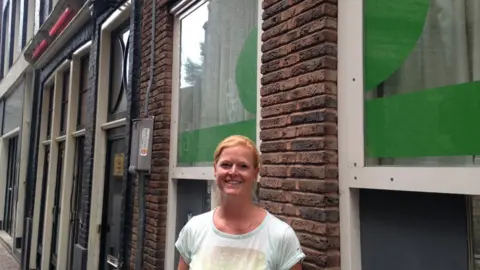 BBC
BBCPrincess Juliana nursery school is sandwiched between two brothels in the middle of Amsterdam's red light district.
If you stand outside, you will hear passing tourists expressing disbelief that a school exists in such a location.
Manager Sally Fritzsche has heard them all - from the man who scolded her as she took the children on their weekly walk, to the tour guides who pretend it is a school for prostitutes' children.
Despite its unusual location, the nursery is one of the best in the Dutch capital - in the last four years, its rating has risen from "red" to "green" on the city's traffic light rating system.
This improvement came despite a cut to a government subsidy which let parents reclaim nursery fees from taxes, which had forced a number of other nursery providers out of business.
Keeping communities alive
Princess Juliana opened on the historic street of Warmoestraat in 1875, and moved to its current location of Oudekerksplein in 1999. It is metres from the canal which runs through Amsterdam's red light district.
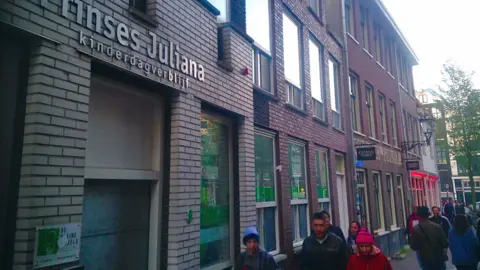
Run by a company called Kleine Wereld ("small world"), the nursery's nine teachers look after 60 children aged from three months to four years.
It opens from 7.30am to 6.30pm, which means there is a lot of overlap with the brothels' opening hours of 10am until late.
Most children at the nursery come from families living in the nearby Nieuwmaarkt district - with fees reasonable for Amsterdam.
The students are from a broad range of backgrounds - some are from migrant families and speak no Dutch, others are children of musicians from well-known Dutch bands.
'Just normal people'
When a new teacher starts at the school, they usually take time to adjust to their unusual commute.
"I have been here four years and still, when I walk past the ladies, I think 'okay where do I look?'," says manager, Sally Fritzsche.
"But it does not bother me. You just think there must be a reason why they are working there and you don't know if it is a good one or a bad one, but you accept it."
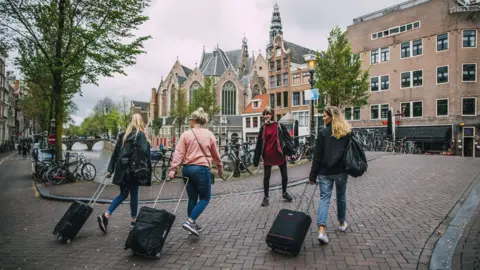 Getty Images
Getty ImagesWilma Korff, who grew up in the area and has taught at Princess Juliana for 28 years, believes the children actually benefit from the nursery's location.
"I would say growing up here had a good effect on me, and it has a good effect on the children," she says.
"They are growing up in a place that is a bit different, and they understand that these ladies are just normal people."
Sally Fritzsche agrees. "These kids learn to see people as people," she says. "They see the women waving and they wave back. They like them, and they have no judgement."
Every week the children are taken for a walk through the neighbourhood in a colourful contraption that resembles several prams joined together.
Tourism pressure
The women in the windows recognise the children - some close their curtain as the group approaches, others wave.
Sometimes the children ask if the brothels are swimming pools. Sally Fritzsche lets parents decide how to answer these questions - but the children are usually too young to realise what they are seeing.
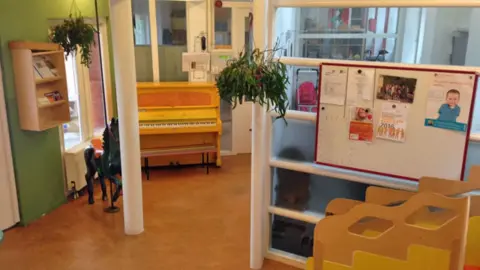
Tourism, or more specifically resentment of tourism, is currently a major issue in Amsterdam - and Princess Juliana plays an unexpected role in slowing it down.
Dr Jan van der Borg, a tourism expert at KU Leuven in Belgium, says the city is suffering from a process that he calls "Venetianisation".
This is named after the Italian city of Venice that has become a symbol of a local economy being saturated by the tourist industry, so much so that it is difficult for ordinary residents to carry on living there as local facilities disappear.
Dr van der Borg describes it as a "touristic monoculture that suffocates other social activities" - and in Amsterdam it means souvenir shops with big clogs and tulips replacing local services.
Amsterdam has responded by banning new tourist shops and the "beer bikes" which were popular with stag dos, and raising taxes on homeowners who rent their rooms for short stays.
Protecting nurseries
But Dr van der Borg thinks this is the wrong approach - he says it is "much more efficient to enhance and strengthen alternative activities to tourism", such as keeping schools open.
He says that if the city "nurtures" schools such as Princess Juliana, Venetianisation "can be slowed or even stopped".
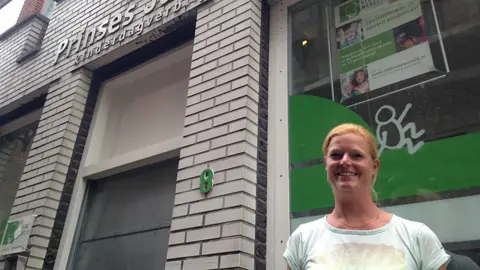
So Princess Juliana, and the nearby secondary schools Sint Antoniusschool and Witte Olifant, play a vital role in preserving a residential community in the centre of Amsterdam.
"I cannot imagine what would happen to the neighbourhood if we were not here any more," says Sally Fritzsche.
"What would parents do with their children? You get a good neighbourhood when you have good facilities around them. If that breaks down, the neighbourhood breaks down too.
"If all houses here were doing Airbnb, the whole neighbourhood would change and there would not be kids living here anymore."
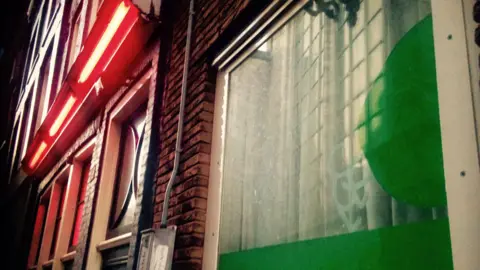
Amsterdam's local authority, which owns the building that houses Princess Juliana, recognises the nursery's importance.
The school's survival was threatened when its former operator pulled out in 2013 because of falling revenues.
But despite the lucrative potential of a large two-storey building in a central location, the council offered it to Kleine Wereld at a discounted rate.
So visitors to Amsterdam will still see a group of children and teachers walking through the red-light district for the foreseeable future.
This summer, Sally Fritzsche was confronted by a tourist during one of these walks. "He stopped us and said, 'what are you doing with kids here?'," she says.
"We were like, we are not going anywhere. We belong here."

More from Global education
Ideas for the Global education series? Get in touch.

